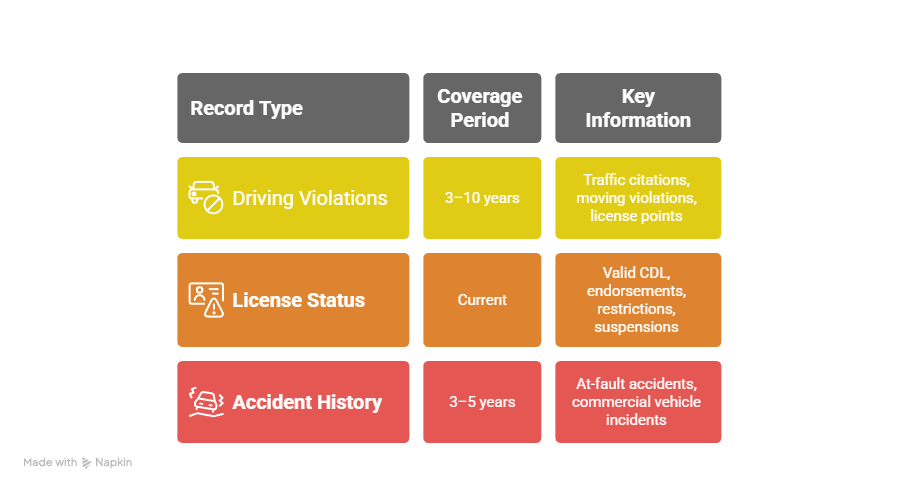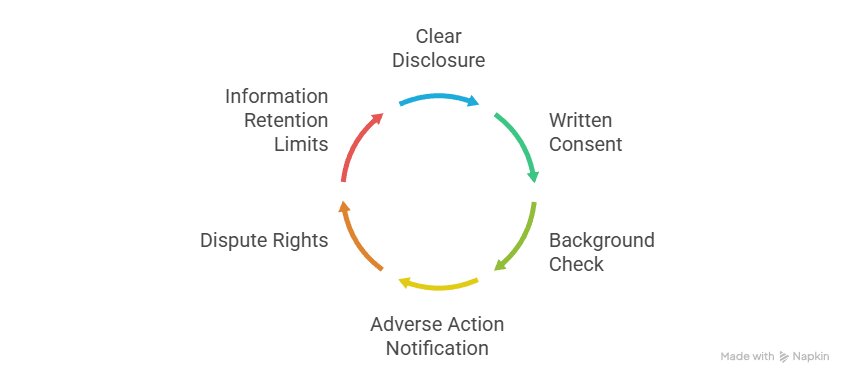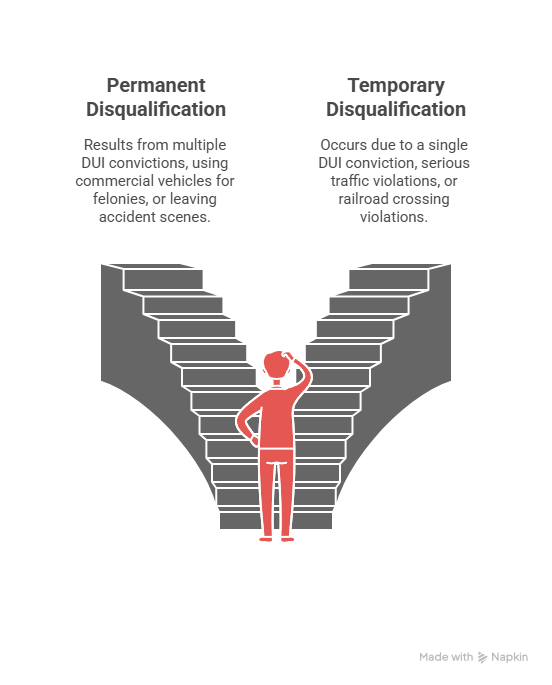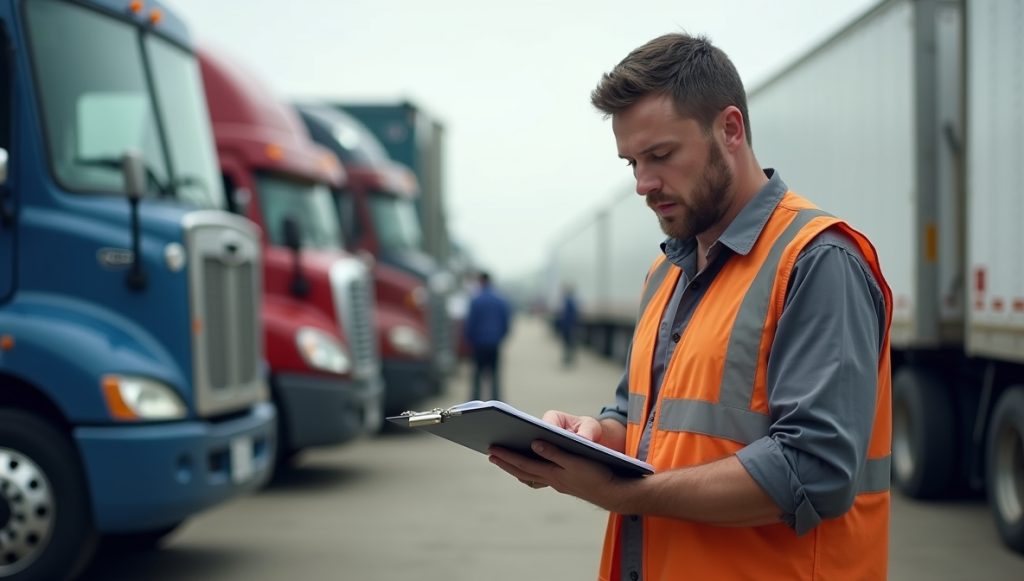California commercial driver background checks are comprehensive screenings that verify driving records, criminal history, and employment eligibility for CDL positions, requiring compliance with federal DOT regulations and state privacy laws. These background investigations help employers maintain fleet safety while protecting drivers' rights under the Fair Credit Reporting Act and California Consumer Privacy Act.
Key Takeaways
- California commercial driver background checks must comply with both federal DOT requirements and state-specific regulations including the CCPA and Unruh Civil Rights Act.
- Employers can access up to 10 years of driving history through the California DMV, including traffic violations, license suspensions, and commercial driving infractions.
- Criminal background screenings for CDL positions require adherence to FCRA guidelines, with specific restrictions on reporting certain convictions after seven years.
- The hiring process must include proper disclosure, written consent, and adverse action procedures when background check results impact employment decisions.
- Pre-employment drug and alcohol testing is federally mandated for all commercial drivers, with ongoing random testing requirements throughout employment.
- Employers face significant liability risks and regulatory penalties for hiring unqualified commercial drivers without proper background verification.
Understanding California Commercial Driver Background Check Requirements
California's commercial driving industry operates under a complex framework of federal and state regulations that govern background screening processes. The Federal Motor Carrier Safety Administration (FMCSA) establishes baseline requirements for all commercial drivers, while California adds additional layers of protection and compliance obligations. Understanding these overlapping jurisdictions is crucial for both employers and job seekers in the commercial transportation sector.
The state's approach to commercial driver screening reflects its commitment to road safety while protecting individual privacy rights. California requires employers to balance thorough vetting procedures with respect for applicants' civil liberties. This dual focus creates a comprehensive system that goes beyond basic federal minimums to ensure qualified, safe drivers operate commercial vehicles throughout the state.
Current statistics show that California employs over 400,000 commercial drivers across various industries, making proper background screening procedures essential for maintaining public safety. The state's diverse geography and heavy freight traffic demands rigorous standards for commercial vehicle operators. These requirements have evolved significantly in recent years to address emerging safety concerns and technological advances in screening capabilities.
Legal Framework and Compliance Standards
Federal DOT Regulations
The Department of Transportation mandates specific background check components for all commercial drivers nationwide. These federal requirements establish the minimum standards that California employers must meet when screening CDL applicants. The regulations cover motor vehicle records, employment history verification, and substance abuse testing protocols that form the foundation of commercial driver screening.
DOT regulations require employers to obtain driving records from all states where applicants held licenses during the previous three years. This multi-state verification process ensures comprehensive coverage of an applicant's driving history. Additionally, federal law mandates verification of employment history for the preceding three years, including contact with previous employers who utilized the driver's CDL.
California State Requirements
California enhances federal standards through additional state-specific regulations that provide extra protection for both employers and drivers. The California Consumer Privacy Act (CCPA) grants applicants specific rights regarding their personal information used in background checks. State law also requires employers to follow strict procedures when using consumer reports for employment decisions, including detailed disclosure and consent requirements.
The state's Unruh Civil Rights Act adds another layer of compliance by prohibiting discrimination based on protected characteristics during the hiring process. California employers must ensure their background check procedures don't disproportionately impact protected classes. These state-level protections work alongside federal requirements to create a comprehensive regulatory environment for commercial driver screening.
Components of California Commercial Driver Background Checks
California commercial driver background checks encompass multiple verification areas designed to assess an applicant's fitness for commercial vehicle operation. Each component serves a specific purpose in evaluating safety risks and regulatory compliance. The comprehensive nature of these screenings reflects the significant responsibility placed on commercial drivers and their employers.
The screening process typically includes motor vehicle records, criminal history checks, employment verification, and substance abuse testing. Each element provides crucial information about an applicant's qualifications and potential risk factors. Modern background check services integrate these components into streamlined processes that meet all regulatory requirements while providing timely results for hiring decisions.
Motor Vehicle Records (MVR) Screening

Motor vehicle records form the cornerstone of commercial driver background screening in California. These records provide detailed information about an applicant's driving performance, safety record, and license status. California maintains comprehensive driving records that include both personal and commercial vehicle violations, giving employers a complete picture of an applicant's road safety history.
Criminal History Verification
Criminal background checks for California commercial drivers must balance thorough screening with fair chance hiring practices. The state's "ban the box" legislation limits initial criminal history inquiries while still allowing comprehensive screening during later hiring stages. Employers must follow specific procedures when criminal history impacts hiring decisions, including individualized assessments and consideration of conviction relevance to job duties.
California's seven-year reporting limitation applies to most criminal convictions, though certain serious offenses may be reportable indefinitely. Commercial driving positions may justify longer lookback periods for safety-sensitive violations. Employers must understand these nuances to ensure compliant screening practices while maintaining safety standards.
Industry-Specific Screening Requirements
Different commercial driving sectors in California face varying background check requirements based on cargo types, route characteristics, and federal oversight levels. Hazmat drivers undergo the most extensive screening due to Transportation Security Administration (TSA) requirements. School bus drivers face additional state-mandated checks focused on child safety protection.
Long-haul trucking companies must comply with interstate commerce regulations that may exceed California's minimum standards. Local delivery services have different requirements than over-the-road carriers. Understanding these industry-specific variations is essential for both employers and job seekers in California's commercial driving market.
Hazmat and Specialized Endorsements
Commercial drivers seeking hazardous materials endorsements undergo enhanced background screening through the TSA's Security Threat Assessment program. This federal screening includes fingerprint-based criminal history checks, immigration status verification, and terrorism-related database searches. The process requires significant additional time and documentation beyond standard commercial driver screening.
Other specialized endorsements like passenger transport or school bus operation trigger additional California-specific requirements. These enhanced screenings reflect the increased public safety responsibilities associated with specialized commercial driving roles. Employers must factor these extended timelines and requirements into their hiring processes for specialized positions.
Transportation Network Companies
California's regulation of transportation network companies (TNCs) creates unique background check requirements for app-based commercial drivers. These platforms must conduct annual background checks on all drivers, including criminal history and driving record verification. The state's specific TNC regulations establish standards that may differ from traditional commercial carrier requirements.
TNC background checks must cover a seven-year period for criminal history and three years for driving records. California requires these companies to remove drivers who develop disqualifying violations between annual screenings. This ongoing monitoring requirement distinguishes TNC drivers from many other commercial driving categories.
The Background Check Process: Step-by-Step Guide
The California commercial driver background check process follows a structured timeline designed to ensure thorough screening while meeting business needs. Employers typically initiate screening after conditional job offers to comply with fair hiring practices. The process involves multiple verification steps that may run concurrently to minimize delays.
Understanding the typical timeline helps both employers and applicants plan appropriately for hiring decisions. Most commercial driver background checks complete within 3-7 business days, though specialized endorsements or complex histories may require additional time. Proper preparation and documentation can significantly streamline the screening process.
Pre-Employment Disclosure and Consent
| Requirement | Description | Timeline |
| Written Disclosure | Separate document explaining background check | Before consent |
| Applicant Consent | Signed authorization for screening | Before investigation |
| Adverse Action Notice | Notification of potential negative decisions | Before final decision |
California law requires specific disclosure and consent procedures before conducting employment background checks. Employers must provide clear, standalone disclosure documents that explain the screening process and applicant rights. These disclosures cannot be buried in employment applications or other documents.
The consent process must be voluntary and informed, giving applicants full understanding of the screening scope. California's enhanced privacy protections require more detailed disclosures than federal minimums. Proper documentation of this process protects both employers and applicants throughout the screening procedure.
Verification and Documentation Timeline
The verification phase involves collecting and analyzing information from multiple sources to build a comprehensive applicant profile. California DMV records typically provide same-day results for driving history verification. Criminal history checks may take longer depending on jurisdiction response times and record availability.
Employment verification often represents the longest component of commercial driver screening due to the need for direct employer contact. California requires verification of three years of employment history, which may involve multiple previous employers. Proper applicant preparation with accurate contact information can significantly reduce verification delays.
Rights and Protections for Job Applicants
California provides extensive protections for job applicants undergoing commercial driver background checks, exceeding federal minimum standards in several key areas. The state's consumer privacy laws grant applicants specific rights regarding their personal information use and retention. Understanding these protections helps applicants navigate the screening process while protecting their interests.
Applicant rights include access to background check results, dispute procedures for inaccurate information, and protection against discriminatory screening practices. California's fair chance hiring laws provide additional protections for applicants with criminal histories. These comprehensive protections create a balanced system that serves both public safety and individual rights.
Fair Credit Reporting Act (FCRA) Compliance
FCRA Requirements for California Commercial Driver Screening:

- Clear Disclosure: Employers must provide standalone written disclosure before obtaining background reports for employment purposes.
- Written Consent: Applicants must provide explicit written authorization before any consumer reporting agency can release employment screening information.
- Adverse Action Procedures: Employers must follow specific notification requirements when background check results lead to negative employment decisions.
- Dispute Rights: Applicants can challenge inaccurate information and require corrections to their consumer reports through established dispute processes.
- Information Retention Limits: Most negative information has specific reporting timeframes, with most criminal convictions limited to seven-year reporting periods.
FCRA compliance forms the foundation of fair employment screening practices in California's commercial driving industry. These federal protections ensure applicants receive proper notice and have opportunities to address potential issues before final hiring decisions. Employers who violate FCRA requirements face significant legal and financial consequences.
California Consumer Privacy Act (CCPA) Protections
The CCPA grants California residents enhanced control over their personal information used in employment background checks. Commercial driver applicants can request detailed information about data collection, use, and sharing practices. These rights extend beyond traditional FCRA protections to cover broader privacy concerns related to personal information handling.
CCPA protections include the right to know what personal information is collected, the right to delete certain personal information, and the right to non-discrimination for exercising privacy rights. These enhanced protections reflect California's leadership in consumer privacy protection and create additional compliance obligations for employers conducting background screenings.
Common Disqualifying Factors and Evaluation Criteria
California commercial driver background checks reveal various factors that may impact hiring decisions, ranging from automatic disqualifiers to considerations requiring individualized assessment. Federal DOT regulations establish certain mandatory disqualifications that apply regardless of state law. California adds additional considerations while providing frameworks for fair evaluation of applicant histories.
Understanding these disqualifying factors helps both employers and applicants prepare for the screening process and potential outcomes. The severity and recency of violations typically influence their impact on hiring decisions. Modern approaches emphasize individualized assessment rather than blanket exclusions where legally permissible.
Mandatory Federal Disqualifications

Permanent DOT Disqualifications:
- Multiple DUI Convictions: Two or more convictions for driving under the influence while operating any motor vehicle result in permanent CDL disqualification.
- Using Commercial Vehicles for Felonies: Conviction for using a commercial motor vehicle in the commission of any felony permanently bars CDL eligibility.
- Leaving Accident Scenes: Conviction for leaving the scene of an accident involving a commercial motor vehicle creates permanent disqualification.
Temporary Federal Disqualifications:
- Single DUI Conviction: First-time DUI conviction results in one-year CDL disqualification, extending to three years for hazmat endorsement holders.
- Serious Traffic Violations: Multiple serious violations within three years trigger progressive disqualification periods ranging from 60 days to 120 days.
- Railroad Crossing Violations: Specific violations at railroad crossings result in disqualification periods from 60 days to one year depending on violation history.
These federal disqualifications apply universally to all commercial drivers in California and cannot be waived by state law or employer policies. The permanent nature of certain disqualifications reflects the serious safety risks associated with these violations.
California-Specific Considerations
California's fair chance hiring laws require individualized assessment of criminal history that goes beyond federal DOT disqualifications. Employers must consider factors like conviction age, relevance to job duties, and evidence of rehabilitation when evaluating applicants with criminal histories. This approach balances public safety concerns with opportunities for individuals with past convictions.
The state's progressive approach to criminal justice reform influences commercial driver hiring practices through requirements for case-by-case evaluation. Employers must document their decision-making processes and demonstrate that exclusions are directly related to job requirements. These protections help qualified individuals with criminal histories access commercial driving opportunities where appropriate.
Best Practices for Employers
California employers conducting commercial driver background checks benefit from implementing comprehensive policies that ensure legal compliance while meeting operational needs. Effective screening programs balance thoroughness with efficiency, creating standardized procedures that protect both company interests and applicant rights. Regular policy updates ensure continued compliance with evolving regulations.
Successful commercial driver screening programs integrate multiple verification components into streamlined workflows. Technology solutions can automate many aspects of the process while maintaining human oversight for complex cases. Training hiring managers on proper procedures reduces compliance risks and improves candidate experience.
Developing Compliant Screening Policies
Effective commercial driver screening policies establish clear procedures for every aspect of the background check process, from initial disclosure through final hiring decisions. These policies should address timing requirements, documentation standards, and decision-making criteria that ensure consistent application across all candidates. Regular policy reviews help organizations adapt to regulatory changes and industry best practices.
Policy development should involve legal counsel familiar with both transportation regulations and employment law to ensure comprehensive compliance coverage. Written procedures protect organizations during regulatory audits and legal challenges while providing clear guidance for hiring personnel. Well-designed policies also improve operational efficiency by standardizing complex screening procedures.
Working with Background Check Providers
| Provider Qualification | Importance | Verification Method |
| FCRA Certification | Critical | Request compliance documentation |
| California License | Required | Verify with state licensing board |
| DOT Experience | High | Review client references and case studies |
Selecting qualified background check providers is essential for California commercial driver screening success. Experienced providers understand the complex regulatory environment and can navigate multi-jurisdictional requirements efficiently. Provider capabilities should align with specific industry needs and volume requirements.
Due diligence in provider selection includes verifying licensing, insurance coverage, and compliance procedures. Regular performance monitoring ensures continued service quality and regulatory compliance. Strong provider partnerships contribute significantly to successful commercial driver hiring programs.
Cost Factors and Timeline Considerations
California commercial driver background checks involve various cost components that employers must budget for as part of their hiring processes. Pricing structures vary significantly based on screening scope, turnaround time requirements, and provider selection. Understanding these cost factors helps organizations develop realistic hiring budgets while ensuring adequate screening thoroughness.
Timeline considerations impact both cost and operational planning for commercial driver hiring. Rush processing typically increases costs while standard timelines offer better value. Balancing speed and cost requirements helps organizations optimize their screening investments while meeting business needs.
Typical Pricing Structure
Standard Commercial Driver Background Check Components:
- Motor Vehicle Records: $15-30 per state searched, with California requiring multi-state verification for comprehensive coverage.
- Criminal History Search: $25-50 for county-level searches, with additional costs for state and federal database access.
- Employment Verification: $20-40 per employer contacted, typically covering three years of work history as required by DOT regulations.
- Drug Testing: $40-80 for pre-employment screening, including DOT-required panel testing and medical review officer services.
- Total Package Cost: $150-300 for comprehensive screening, varying based on complexity and provider selection.
These cost ranges reflect typical market pricing for California commercial driver background checks in 2024. Volume discounts and package deals may reduce per-screening costs for larger employers. Additional services like ongoing monitoring or specialized endorsement screening increase total investment.
Processing Timeline Expectations
Standard commercial driver background checks in California typically complete within 3-7 business days for straightforward cases. Complex histories or hard-to-reach previous employers may extend timelines to 10-14 days. Expedited processing options can reduce turnaround times but increase costs significantly.
Planning hiring timelines around realistic screening expectations helps avoid operational disruptions and candidate frustration. Peak hiring seasons may experience longer processing times due to increased demand. Advance planning and early screening initiation help organizations maintain consistent hiring velocity while ensuring thorough vetting procedures.
Conclusion
California commercial driver background checks represent a critical component of transportation industry safety and regulatory compliance. The state's comprehensive approach balances thorough screening requirements with strong applicant protections, creating a framework that serves both public safety and individual rights. Success in this complex regulatory environment requires understanding of federal DOT requirements, state-specific regulations, and evolving privacy protections that shape modern employment screening practices. Organizations that invest in compliant, comprehensive screening programs protect themselves from liability while contributing to safer roads throughout California.
Frequently Asked Questions
How long do California commercial driver background checks take to complete?
Most California commercial driver background checks complete within 3-7 business days, though complex histories or specialized endorsements may require 10-14 days. Factors affecting timeline include multi-state driving records, employment verification responses, and criminal history complexity. Expedited processing options are available for urgent hiring needs but typically cost 50-100% more than standard timelines.
What disqualifies someone from passing a commercial driver background check in California?
Permanent federal disqualifications include multiple DUI convictions, using commercial vehicles for felonies, and hit-and-run violations. Temporary disqualifications result from single DUIs (1-3 years), serious traffic violations, and railroad crossing violations. California requires individualized assessment of other criminal history, considering factors like conviction age, relevance to duties, and rehabilitation evidence.
Can employers in California check driving records from other states?
Yes, California employers must obtain driving records from all states where applicants held licenses during the previous three years, as required by federal DOT regulations. This multi-state verification ensures comprehensive coverage of driving history and compliance with interstate commerce requirements. The process typically adds 1-2 days to background check timelines.
What rights do applicants have during the California commercial driver background check process?
Applicants have extensive rights including written disclosure before screening, voluntary consent requirements, access to background check results, and dispute procedures for inaccurate information. California's Consumer Privacy Act provides additional protections for personal information use. Fair chance hiring laws require individualized assessment of criminal history rather than blanket exclusions.
How often must California commercial drivers undergo background checks?
Initial pre-employment screening is required for all commercial drivers, with ongoing monitoring varying by employer and industry sector. Transportation network companies must conduct annual background checks on all drivers. Many employers implement periodic rescreening every 2-3 years or when moving violations occur to maintain safety standards.
What happens if a California commercial driver fails their background check?
Employers must follow specific adverse action procedures including pre-adverse action notices, opportunity for applicant response, and final adverse action notification with appeal rights. California's fair chance hiring laws may require individualized assessment and consideration of mitigating factors before final decisions. Applicants can dispute inaccurate information and request reconsideration based on corrected records.
Are there different background check requirements for different types of commercial driving in California?
Yes, requirements vary significantly by industry sector and endorsement type. Hazmat drivers undergo enhanced TSA security threat assessments, school bus drivers face additional child safety screenings, and transportation network company drivers have specific annual screening requirements. Interstate carriers may have additional federal requirements beyond California minimums.
How much do California commercial driver background checks typically cost?
Comprehensive commercial driver background checks in California typically cost $150-300, including motor vehicle records ($15-30 per state), criminal history searches ($25-50), employment verification ($20-40 per employer), and drug testing ($40-80). Volume discounts and package deals may reduce costs for larger employers, while expedited processing increases fees by 50-100%.
Additional Resources
- Federal Motor Carrier Safety Administration (FMCSA) Background Check Requirements
https://www.fmcsa.dot.gov/regulations/hiring/pre-employment-screening-program - California Department of Motor Vehicles Commercial Driver License Information
https://www.dmv.ca.gov/portal/driver-licenses-identification-cards/commercial-driver-license-cdl/ - Fair Credit Reporting Act Compliance Guide for Employers
https://www.ftc.gov/business-guidance/resources/fair-credit-reporting-act-compliance-guide-employers - California Consumer Privacy Act Employer Guidelines
https://oag.ca.gov/privacy/ccpa - Transportation Security Administration Hazmat Endorsement Requirements
https://www.tsa.gov/for-industry/hazmat-endorsement - California Labor and Workforce Development Agency Fair Chance Hiring Resources
https://www.labor.ca.gov/employers/fair-chance-act/ - Professional Background Screening Association Best Practices
https://www.professionalbackground.org/
Still have questions?
Get in touch with our team today for a personalized demo and discover how our tailored volume pricing and packages can drive results for your business!
How useful was this page?*
Note: your comments are anonymous. We use them to improve the website. Do not include any personal details.
Visit our FCRA Compliance Tool or leave a message here if you need a response.
From the blog Explore the GCheck Content Hub

How Long Do Background Checks Take for Government Jobs? Timeline Expectations for 2026
6 Jan, 2026 • 20 min read
Driver Qualification File Requirements: Your Complete DOT Compliance Guide
6 Jan, 2026 • 18 min read
Healthcare Background Screening Costs: 2026 Budget Planning Guide for Medical Facilities
30 Dec, 2025 • 23 min readThe information provided in this article is for general informational and educational purposes only and should not be construed as legal advice or a substitute for consultation with qualified legal counsel. While we strive to ensure accuracy, employment screening laws and regulations—including but not limited to the Fair Credit Reporting Act (FCRA), Equal Employment Opportunity Commission (EEOC) guidelines, state and local ban-the-box laws, industry-specific requirements, and other applicable federal, state, and local statutes—are subject to frequent changes, varying interpretations, and jurisdiction-specific applications that may affect their implementation in your organization. Employers and screening decision-makers are solely responsible for ensuring their background check policies, procedures, and practices comply with all applicable laws and regulations relevant to their specific industry, location, and circumstances. We strongly recommend consulting with qualified employment law attorneys and compliance professionals before making hiring, tenant screening, or other decisions based on background check information.

